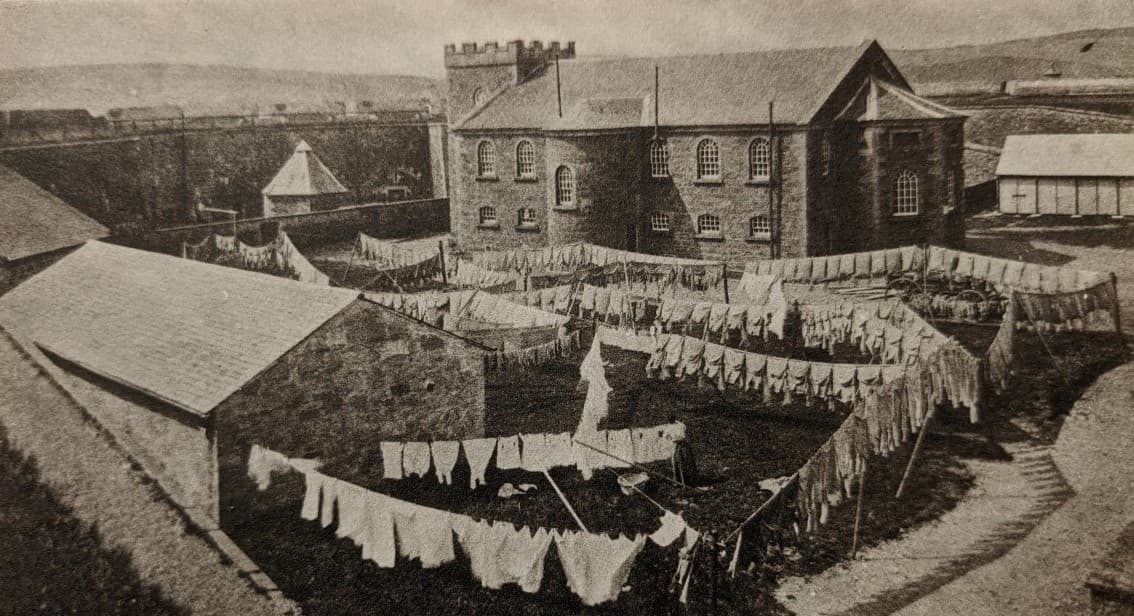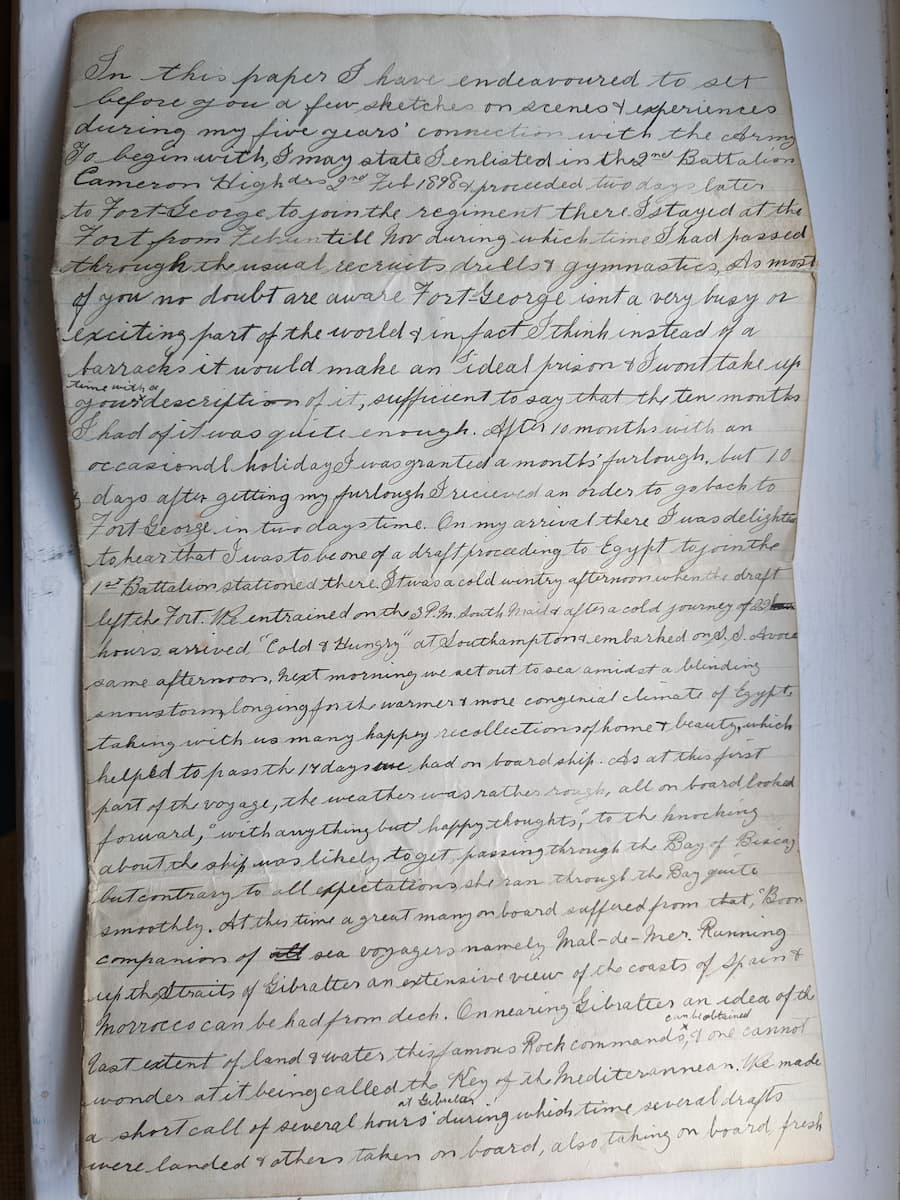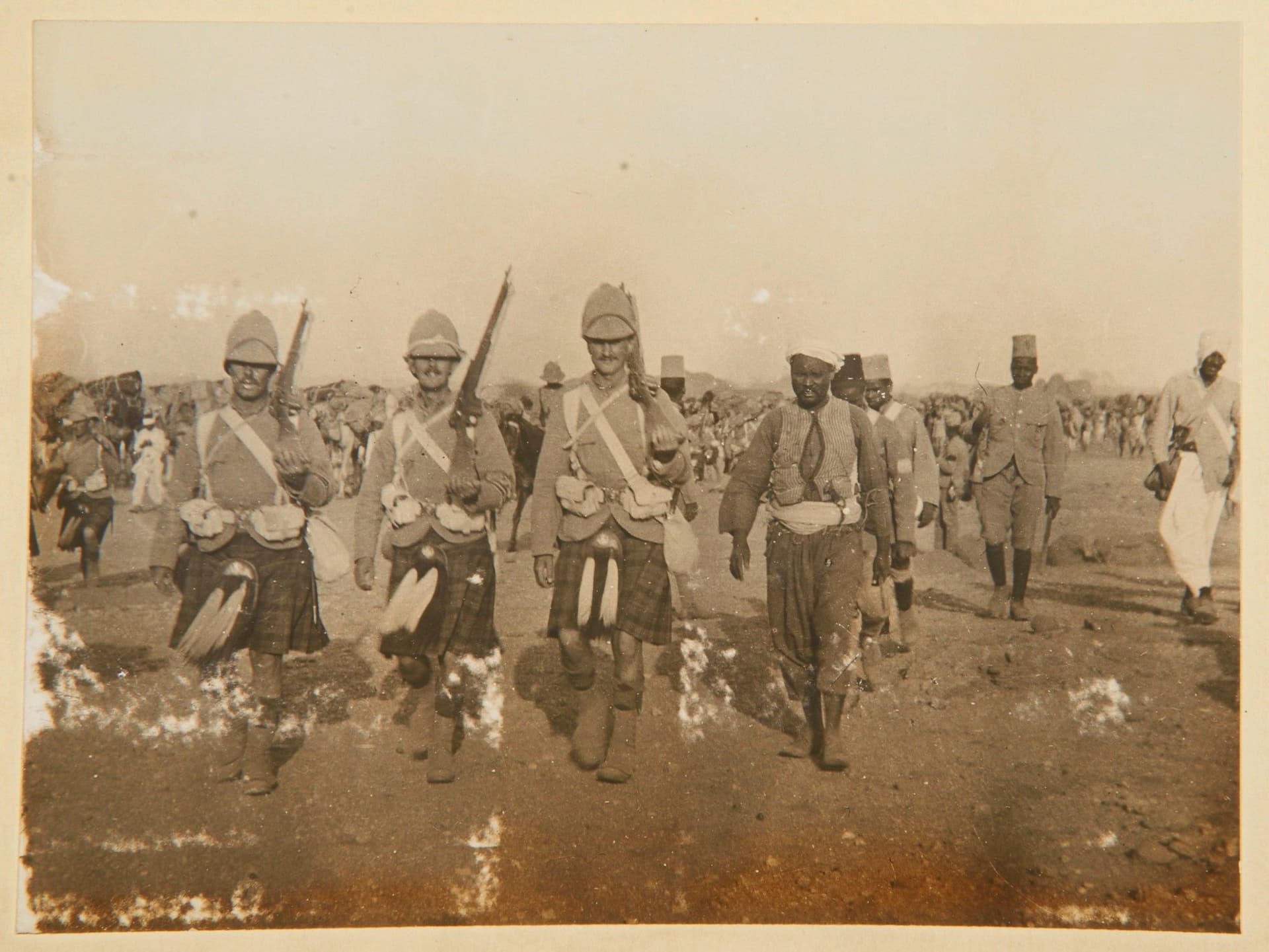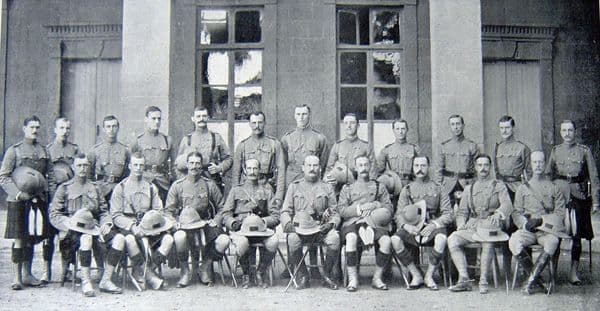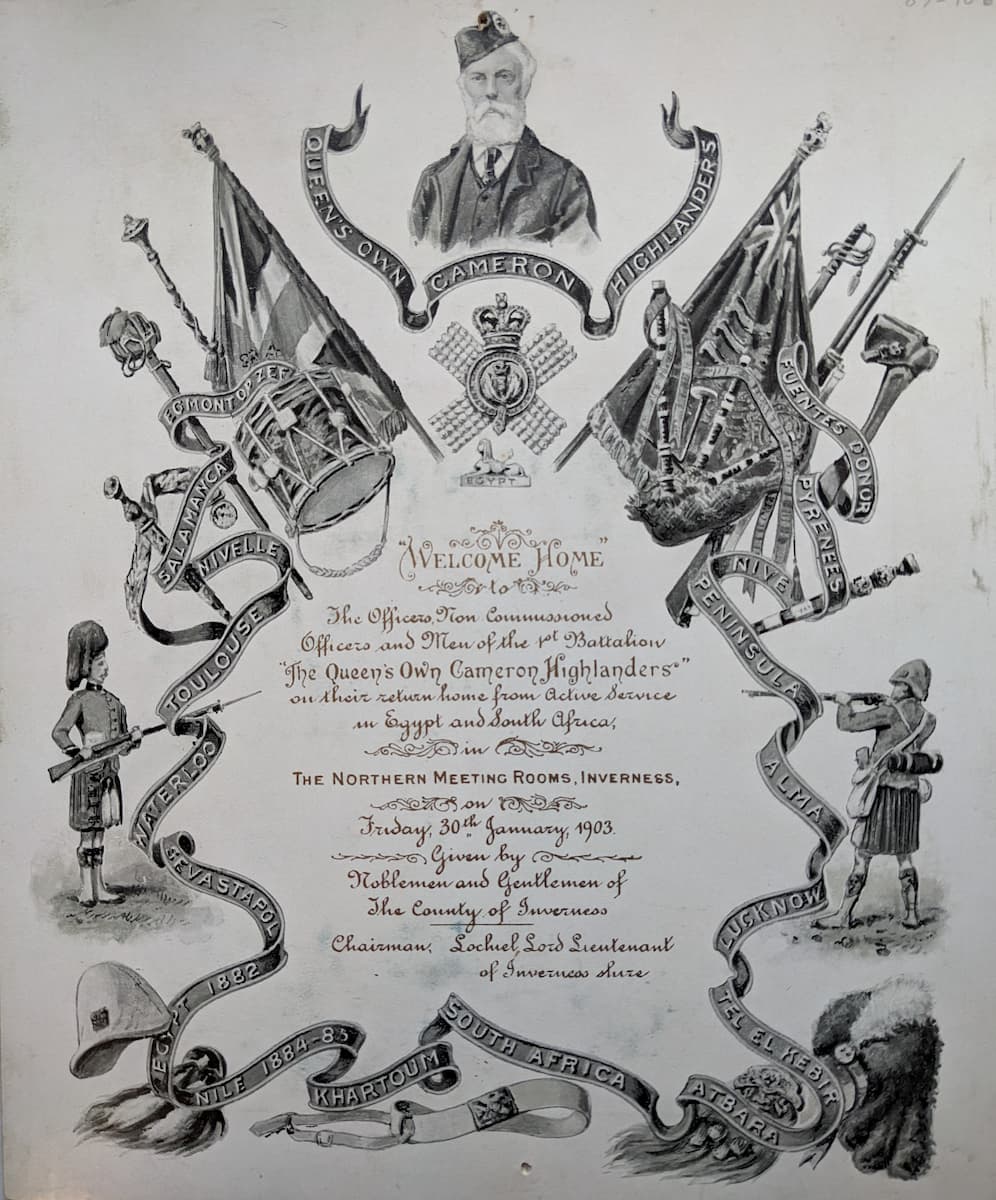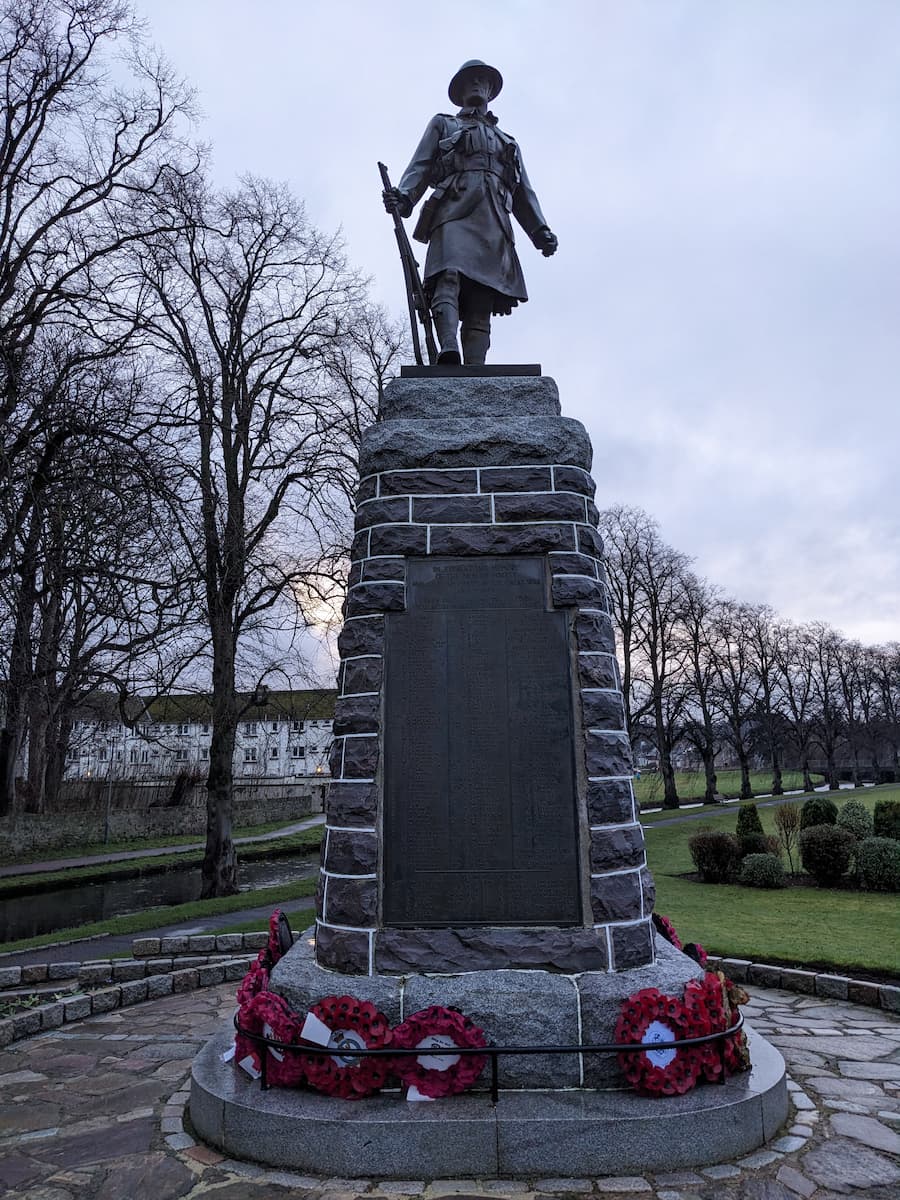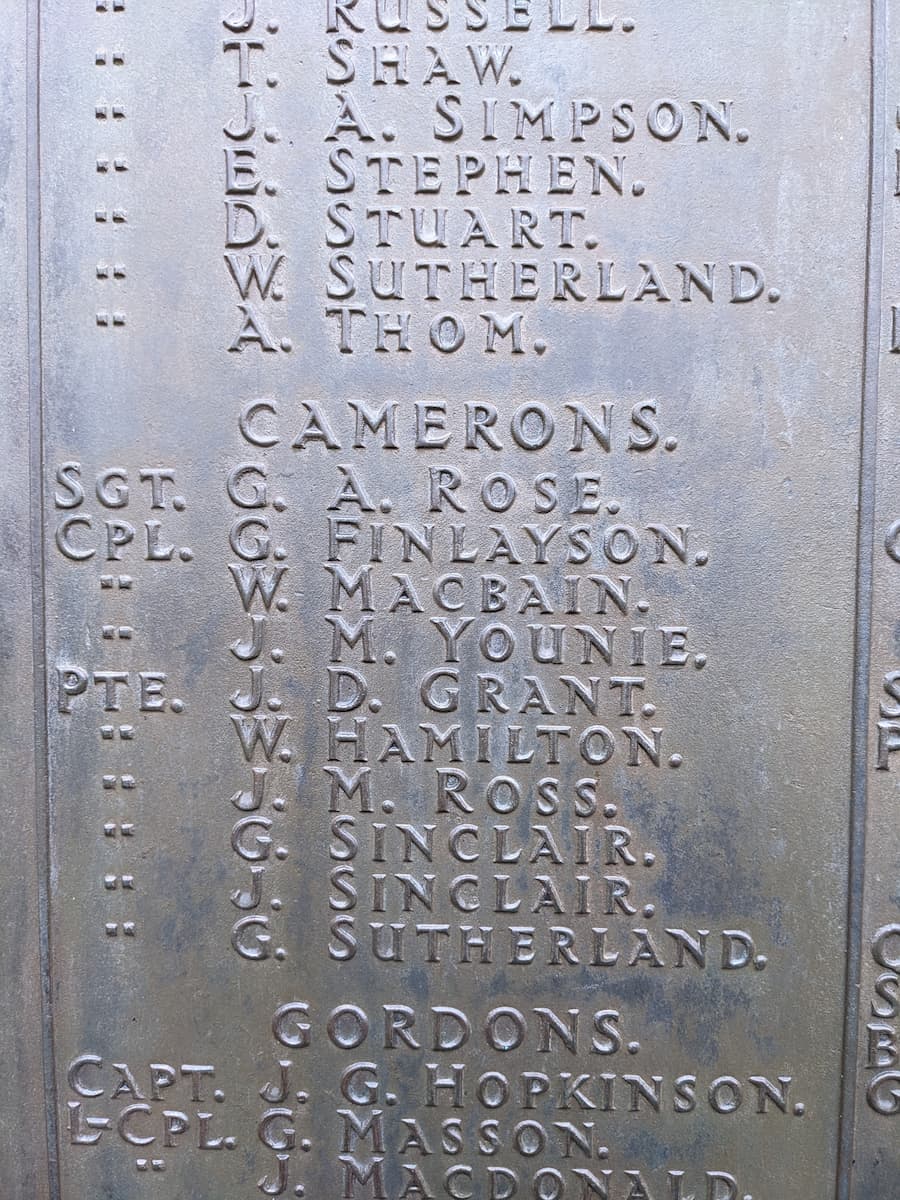Around Africa in 61 Days
(and 42 months)
“In this paper I have endeavoured to set before you a few sketches on scenes and experiences during my five years connection with the Army” So began Private G A Rose, 1st Queens Own Cameron Highlanders in his six-page, handwritten travelogue of what would turn out to be 17 years under the colours.
It is hard to imagine in these days of world cruises or gap-year backpacking (depending on your age and budget) but in the late 1800’s neither were really an option. Yet this son of a tailor managed to do both when he enlisted with the Queen’s Own Cameron Highlanders, then based at Fort George, on 2nd February 1898, aged only 15.
George Answorth Rose was born in Forres, Morayshire, on 27th June 1882, the eldest son of George and Jessie Rose. At the time he enlisted he had four younger sisters and a brother; as the eldest would have been expected to be earning his keep. The lure of the pipes and drums must have sounded more exciting than a life of tailoring, so he sounds a little disappointed with his first experiences as a soldier when he recalled that “Fort George isn’t a very busy or exciting part of the world and in fact I think instead of a barracks it would make an ideal prison”. After 10 months at Fort George he was more than happy to be included in the draft of men selected to reinforce the 1st Battalion, then stationed in Egypt.
After a cold and drafty 22 hours on the mail train to Southampton, they boarded the SS Aurea and set sail on 1st December 1898 in a snowstorm, looking forward to the warmer and more congenial Egyptian climate. The 17-day voyage to Port Said took in brief stops at Gibraltar, with its “extensive views of the coasts of Spain and Morroco”, Malta where “our ship was surrounded by dozens of Bum-Boats the occupants of which did a roaring trade in all kinds of fruits and tobaccos etc”, and Crete where a battalion of Welsh Fusiliers joined the ship enroute for Hong Kong.
From Port Said they took a train to Cairo where “for several months after our arrival we were nearly plagued to death by mosquitos, insects which seem to know when any fresh blood arrives in the country”. Based in the Citadel, the huge medieval-era fortification that dominates the Cairo skyline, he describes a city “mapped out at the spectator’s feet, every object distinctly seen in the clear atmosphere. There are large and lovely gardens, grand palaces, beautiful public fountains, tombs of the mighty dead, as large in some instances as had been their houses when alive, two or three hundred mosques with their large domes and tall minarets are to be seen standing high above the surrounding buildings. Then there is the blue Nile, stretching from North to South, which seems to divide the City from the country”. He visited the zoo, the museum, the Ghezira Palace as well as taking an interest in the local customs, describing in detail a Muslim funeral and the Ramadan fast, which fell in January that year.
He had been in Cairo for only 8 weeks, more time spent sightseeing than soldiering it seems, when the 1st Camerons were ordered to South Africa, where the Boer War had not been going well for the British. Embarking at Suez, they set sail on the SS Simba on 3rd March 1900, arriving at East London on 24th. The “splendid voyage of 21 days” included a day ashore at Zanzibar while the ship took on coal, then as now one of the more exotic destinations on the continent. Sadly, one of the Sergeants died enroute and was buried at sea “that saddest of all burial ceremonies” according to Private Rose. Even more tragically, the day before arrival in South Africa one of the ship’s company, a 16 year old apprentice, was lost overboard and despite the ship turning around and lowering boats, was never found.
At East London, the battalion boarded coal trucks and were taken by rail to Bloemfontein, in Private Rose’s rather droll words “not a very pleasant journey but, as the saying goes ‘a third class ride is better than a first class walk’”.
He spent the next two-and-a-half years in South Africa doing an awful lot of marching and a little bit of fighting: the 1st Camerons saw action at Pretoria, Diamond Hill, and Spitzkopf. After peace was declared on 31st May 1902, the battalion was stationed at Johannesburg for three months before orders were received to proceed to Port Elizabeth and embark for home. Departing on 18th September onboard the SS Dunera, they briefly stopped in Cape Town to resupply before steaming up the West Coast of Africa to Las Palmas in the aptly named Canary Islands where “many of our men bought Canaries, Monkeys and Parrots from the locals”. Clearly the rules on importing live animals to the UK were more relaxed back then.
A brief stop in Gibraltar, where Private Rose noted that “With this call I had all but been round the whole continent of Africa, the part I missed being between East London and Port Elizabeth”. The total distance around the African coastline is approximately 18,900 miles and he had sailed all but 189 miles of it, so a reasonable boast.
From Gibraltar it was a short hop to Southampton and then a train to Fort George where they arrived on Saturday 11th October. Concluding his travelogue with the words: “A week after our return home I was granted 2 months furlough and taking the mid-day train from Fort George station arrived in good old Forres on a Saturday after a short absence of four years”, Private Rose ends his tale with the same laconic understatement as the start. A few months later, on 30th January 1903, the Nobles and Gentlemen of the County of Inverness held a welcome home parade and banquet for the officers and men of 1st Camerons, the meal described in the Inverness Courier as “excellent and abundant. The soldiers were also supplied with cigars and cigarettes, the latter being tied in neat bundles with red, white and blue ribbon”.
George Rose stayed with the Camerons, serving in China, India, and finally the Western Front in France, by which time he had risen to the rank of Sergeant and mentioned in despatches. He was killed on the first day of the Battle of Loos, 25th September 1915, aged 33 years old, when attacking the German trench lines south of the Hulloch – Vermelles road. On the morning of the battle the 8th Berkshires and 10th Gloucesters were supported by 1st Camerons who followed in two lines at a short interval, two Companies in each. The Camerons passed through the two leading battalions and continued the assault through the enemy’s third line and finally reached their objective on the outskirts of Hulloch village. Unfortunately, lacking further support, the village could not be held and the battalion fell back with casualties of 17 Officers and 369 men.
Sergeant G.A.Rose is buried the Duds Corner war cemetery in France and commemorated on the town war memorial in Forres.
By Craig Durham, Volunteer at The Highlanders’ Museum (Queen’s Own Highlanders Collection)

